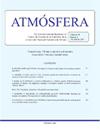Cold fronts responsible for intense winds in the Santos Basin, Brazilian Southeast Offshore Region
IF 1
4区 地球科学
Q4 METEOROLOGY & ATMOSPHERIC SCIENCES
引用次数: 0
Abstract
This work aimed to identify the synoptic conditions associated with the cold fronts (CFs) passage that causes intense winds in the Santos Basin. Furthermore, the atmospheric characteristics of the CFs, which generated intense (INTW) and moderate (MODW) winds in the studied area, were identified. For this purpose, INTW and MODW composites of CFs episodes were elaborated. First, the INTW and MODW cases were selected from the 10 m wind intensity observed in the Santos buoy, belonging to the Brazilian National Buoys Program. Satellite images and synoptic surface charts were analyzed to identify the synoptic systems responsible for INTW and MODW in the Santos buoy, keeping only the cases generated by CFs. From the comparison between the composites, it was possible to observe in INTW: (i) a stronger pressure gradient over the Santos Basin, with the isobars presenting an almost meridional position near the basin, which caused the intense winds registered in the buoy; (ii) a baroclinic trough at medium and high levels reaching the Santos Basin region, located westward of the surface system; (iii) stronger 1000-500 hPa layer thickness and dew point temperature gradients over the continent, reaching the Santos Basin region, and (iv) a colder and drier air mass over southern Brazil. On a large scale, the Rossby wave tracings were analyzed, where different wavenumbers were noticed for each composite. In INTW, the wavenumber was 2, while in MODW, it was 2 and 3. Finally, the main characteristics found in the composites were observed in the case studies.冷锋对巴西东南近海地区桑托斯盆地的强风负责
这项工作旨在确定与冷锋(CFs)通道相关的天气条件,冷锋(CFs)通道导致桑托斯盆地的强风。此外,本文还分析了在研究区产生强风(INTW)和中风(MODW)的环流的大气特征。为此,对CFs集的INTW和MODW组合进行了阐述。首先,从Santos浮标观测到的10 m风强度中选择INTW和MODW案例,该浮标属于巴西国家浮标计划。分析了卫星图像和天气地面图,以确定造成Santos浮标INTW和MODW的天气系统,仅保留cf产生的情况。通过对复合材料的比较,可以观察到INTW:(i) Santos盆地上空的压力梯度更强,等压线在盆地附近几乎呈经向位置,这导致了浮标上记录的强风;(ii)一条中、高空斜压槽到达桑托斯盆地地区,位于地面系统西侧;(iii)大陆上空的1000-500 hPa层厚度和露点温度梯度增强,到达桑托斯盆地地区;(iv)巴西南部上空的气团更冷、更干燥。在大尺度上,分析了罗斯比波跟踪,其中每个合成都注意到不同的波数。在INTW中,波数为2,而在MODW中,波数为2和3。最后,在案例研究中观察了复合材料的主要特征。
本文章由计算机程序翻译,如有差异,请以英文原文为准。
求助全文
约1分钟内获得全文
求助全文
来源期刊

Atmosfera
地学-气象与大气科学
CiteScore
2.20
自引率
0.00%
发文量
46
审稿时长
6 months
期刊介绍:
ATMÓSFERA seeks contributions on theoretical, basic, empirical and applied research in all the areas of atmospheric sciences, with emphasis on meteorology, climatology, aeronomy, physics, chemistry, and aerobiology. Interdisciplinary contributions are also accepted; especially those related with oceanography, hydrology, climate variability and change, ecology, forestry, glaciology, agriculture, environmental pollution, and other topics related to economy and society as they are affected by atmospheric hazards.
 求助内容:
求助内容: 应助结果提醒方式:
应助结果提醒方式:


